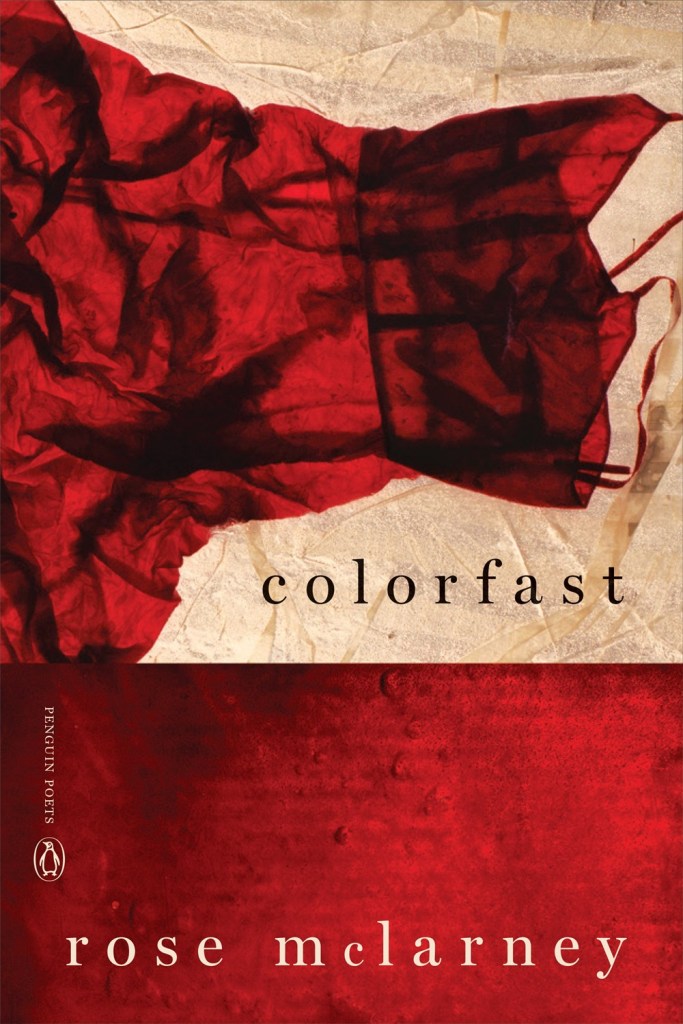Rooted in loss, remembrance and Southern Appalachian landscape, the poems in Rose McLarney’s Colorfast reckon with aging, memory’s unreliability and the female experience. These poems personify nature, examine heritage and explore the family ties and stories that some individuals celebrate, and others bury.
One of the most noticeable poems is “Practice.” It opens quietly, reverently, with, “Tell the fruit trees when the owner dies, / folk wisdom advises.” The poem is an examination of grief and mourning, and the many forms that practice can take in a society ultimately separated from nature. One of the most striking stanzas is the speaker’s assertion, “And then figure out how to want to continue / to breathe—.” In these lines, readers the overwhelming weight of loss. Transcendental in both tone and voice, the poem ends with the succinct, yet phenomenal observation, “This practice / is not for the sake of the trees.” These lines initially seem simple, and the line structure’s simplicity and the language’s minimalism contribute to the observation’s emotional heaviness.
Similarly, the poem “Blackberries” is a deceptively sleek poem. Concealed in its couplets are philosophical insights like, “When summer is full, / the sparrows are too” and “Or winters of any sort / will be deterred by your jars.” The poem does not only celebrate nature. Its imagery exults survival and uplifts the survivalist attributes and resilience inherent in plants and animals, from which the majority of humanity lives separated. The poem also relies on the predominantly Appalachian tradition of preserving fruits and vegetables via canning for use in winter as a representation of preserving one’s heritage. For example, the speaker notes that “preserve” is “really the word / for anything you can do.” A sense of fortitude and determination develops, one that continues in poems such as “Head of the Family.”
“Head of the Family” centers around the importance and significance of family in Appalachian culture and transgenerational remembrance. It develops a universal correlation due to its incorporation of images of whales “beaching themselves by the dozens.” The speaker’s family gathers around a dying grandfather, “all standing here.” The family’s presence is an act of solidarity. However, more significantly, the family’s gathering is a means of easing the grandfather’s dying and assuring him “of what lies ahead” and that the family wishes “to go on living.”
Remembrance is a significant motif in Colorfast, predominantly focusing on cultural, historical and familial remembrance, but prehistoric remembrance is also used. In “Given Such Options,” prehistoric remembrance collides with female remembrance. The poem relies on images of a fossilized ichthyosaur whose three young were fossilized with her, “One pushed out first,” “One in the birth canal,” and “one dangling, // head extended into the world / where the body couldn’t follow.” The poem develops a dystopian tone as it continues and the speaker imagines that the ichthyosaur “couldn’t have carried / knowledge” about the species’ imminent extinction and that “The sediment came when it did, // sealing them in their varied positions.” Again, survival is paramount to the poem, and — if considered in the context of current events surrounding women’s rights throughout the United States — it develops an eerie, prophetic warning about how quickly choice and freedom can be demolished.
Another poem utilizing the role of prehistory in Appalachia is “Fossils Aren’t Found in Appalachia.” Remembrance and preservation, as well as generational survival, develop a literal context. The speaker asserts, “The mountain-building events of / our region prevented preservation / of remains, the scientist claims.” The fossils preserved in Appalachia “are only fossils washed downstream,” “saved in sand” and “by the sea.” The fossilization process conceals the speaker’s deeper message about the inherent survivalism prevalent in not only Appalachian culture but also Appalachian people. The speaker asserts that they would rather “speak of a buoyant body” that carries “over hundreds of miles, / millions of years, a story.” The speaker then observes that, in the field of paleontology, “rearticulating” means “Putting back together / a skeleton is what that means.” Thus, the poem concludes defiantly, with an implied assertion that as time progresses, so will Appalachia’s — and Appalachians’ — legacy.
To the ever-widening world of Appalachian literature, Colorfast offers a new, fresh voice with necessary perspectives as it reconsiders family stories, historical omissions and generational female burdens and elegies. Colorfast is necessary and provocative, inclusive and exploratory.
POETRY
Colorfast
By Rose McLarney
Penguin Books
March 05, 2024


